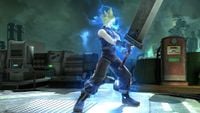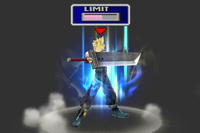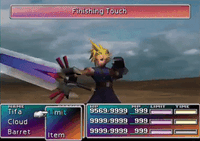Limit Charge / Finishing Touch
- For the tournament, see Tournament:Limit Break.
| Limit Charge / Finishing Touch | |
|---|---|
{{{content1}}}
{{{content2}}} Limit Charge and Finishing Touch in Super Smash Bros. Ultimate. | |
| User | Cloud |
| Universe | Final Fantasy |
Limit Charge (リミットチャージ, Limit Charge) is Cloud's down special move.
Overview
Limit Charge
Cloud possesses a Limit Gauge as a fighter ability, which fills over the course of a battle as he deals or takes damage, much like Little Mac's Power Meter. This gauge is normally invisible in Super Smash Bros. 4, and displayed above his damage meter in Super Smash Bros. Ultimate. However, an alternative method of filling the Limit Gauge is by using his down special, Limit Charge, which works akin to an auto-charge special. This additionally displays the gauge above Cloud himself, which is the only way to view its status in Smash 4.
Limit Charge can be charge-canceled by pressing the special button, in addition to all conventional methods of charge-cancelling (shielding, rolling, or air dodging, as well as spot dodging or jumping in Ultimate), which can be used situationally to move or attack quickly out of the charge cancel. Charge-canceling the move is instantaneous in Smash 4, but incurs 7 frames of lag in Ultimate, making it more committal in the latter game.
In Smash 4, even if Cloud is attacked while charging, the meter will visibly fill up in proportion to the sustained damage. However, Ultimate has the opposite effect, where taking damage mid-charge or during the move's charge-cancel lag instead drains the meter accordingly. Additionally, if he gets grabbed out of either portion, any subsequent pummels and throws used on him, as well as other characters' collateral attacks, will drain the meter as well until he breaks out of the grab. Oddly enough, this does not apply to command grabs, with the sole exception of Force Palm.
Limit Charge is one of the only chargeable special moves that can be used to instant charge-cancel, along with Gyro and Needle Storm, and this advanced technique is referred to as Instant Limit canceling for Cloud. It allows him to bypass every conventional charge-cancel method (including the option to cancel Limit Charge with another special button press) and perform either his neutral attack, tilt attacks, or smash attacks almost instantly out of Limit Charge. This technique was removed in Ultimate; additionally, even shielding and dodging out of Limit Charge have the same delay as canceling the move with the special button.
Limit Break status
Regardless of how full charge is obtained, Cloud will undergo a "Limit Break" status, emitting a blue, flame-like aura from his body, accompanied by the sound effect from Final Fantasy VII. If the gauge is fully charged via his down special, Cloud will also announce 「限界を超える」 (localized in Cloud's reveal trailer as "Limits are meant to be broken"). While retaining Limit Break status, most of his attributes change, with various increases to all his mobility stats. It also allows him to use a more powerful version of his special moves for one use, which will fully expend the Limit Gauge once performed. Though Limit Break lasts until Cloud expends the gauge or gets KO'd in Smash 4, it lasts only up to 15 seconds in Ultimate, forcing Cloud to behave more aggressively and charge wisely, as he can otherwise lose on a valuable KO option or be forced to use his regular, much less effective Climhazzard during a recovery situation.
The Limit Break status has no effect on Omnislash, and vice versa.
Finishing Touch
If the down special input is pressed again when the Limit Gauge is full, Cloud will instead perform Finishing Touch (画竜点睛, Finishing Touch), a large whirlwind slash that deals only 1% damage, but has very high knockback. It is able to KO most fighters before 70%, launching foes too close to Cloud upward, though those that approach after the initial damaging hitbox are pushed away by a windbox. The move has less knockback when hitting opponents behind Cloud, KOing about 10% later, and even less knockback when performed in the air, KOing about 24% to 36% later, depending on the opponent's position. Despite its power, Finishing Touch can be shielded, countered (though this is not very punishing due to the move's extremely low damage), or armored, negating its huge knockback while leaving Cloud wide open to attack. If used in the air, Cloud will briefly hover in place until the move ends, which can somewhat help his recovery, although a Limit Break Climhazzard is significantly better in this regard. Attempting Finishing Touch counts as using an improved special move, and will reset the Limit Gauge.
A nearly complete list of grounded Finishing Touch KO percentages in Smash 4 can be found here. Because Finishing Touch treats every character as having a weight of 100, the fall speed and gravity of that character is instead the main factor of surviving the move. For example, Bowser, the heaviest character, is KO'd at 59.5%/70% (hitting in front and from behind respectively), while Fox, the fastest faller, is KO'd at 74%/85%, which is the highest percentage required across all characters, barring Shulk with the Shield Art activated. Corrin is KO'd at 64%/74%, while Bayonetta is KO'd at 68%/79%, and Cloud himself survives 3% longer in Limit Break.
In Ultimate, Finishing Touch has slightly faster startup and slightly more knockback scaling, but possesses more endlag. It also no longer ignores weight. However, before the 2.0.0 update in Ultimate, it also had a slightly smaller hitbox due to an error, rendering it unable to hit prone opponents. This has since been fixed.
Limit Gauge mechanics
Charging
Cloud's Limit Gauge follows its own system of units for filling up, with a total of 100 units needed to reach Limit Break status. Dealing damage adds units equal to 0.4× of the amount dealt in Smash 4, and 0.667× in Ultimate, while taking damage adds units equal to the respective amount. As a result, filling up the Limit Gauge only by dealing damage requires a sum of at least 250% in Smash 4, and 150% in Ultimate, while filling it up only by taking damage requires a sum of at least 100% in both games. Dealing damage to shields, with items, equipment effects (such as Speed Crasher and Shield Exploder), or to targets not affiliated to players (such as item or stage hurtboxes) do not count towards filling up the gauge.
Limit Charge, on the other hand, adds a specific amount of units each frame it is active. In Smash 4, this is equal to 0.25 from version 1.1.5 onward, and 0.28 prior to this version, so Limit Charge needs to be active for 400 and 358 frames (6.667 and 5.967 seconds), respectively, to reach Limit Break status without dealing or taking damage. In Ultimate, Limit Charge adds 0.3 units per frame from version 7.0.0 onward, or 0.25 prior to this version, so within the same conditions, it needs to be active for 334 and 400 frames (5.567 and 6.667 seconds), respectively.
In Ultimate, when Cloud gets hit out of Limit Charge (or grabbed alongside any subsequent damage until release), the Limit Gauge loses the amount of units it would have gained instead, so with a gauge close to full, taking slightly below 100% damage is enough to fully empty it. Additionally, once Limit Break status is reached, the Limit Gauge is emptied (therefore removing the status as well) if a special move is not used within 15 seconds; unlike the Final Smash Meter's similar timeout mechanic from version 4.0.0 onward, no visual indication is offered to players of how close the Limit Break status is to being lost.
Stat increases
| Stat | Base value | Multiplier | Resulting value |
|---|---|---|---|
| Walk acceleration | 0.1575 0.15 |
1.15× | 0.181125 0.1725 |
| Walk speed | 1.155 1.1 |
1.15× | 1.32825 1.265 |
| Dash speed | 2.145 1.8 |
1.1× | 2.3595 1.98 |
| Run acceleration | 0.11 0.1 |
1.1× | 0.121 0.11 |
| Run speed | 2.167 1.97 |
1.1× | 2.3837 2.167 |
| Traction | 0.106 0.055 |
1.15× | 0.1219 0.06325 |
| Air acceleration | 0.07 | 1.2× | 0.084 |
| Air speed | 1.155 1.1 |
1.2× | 1.386 1.32 |
| Air friction | 0.009 | 1.15× | 0.01035 |
| Gravity | 0.098 | 1.1× | 0.1078 |
| Fall speed | 1.68 | 1.1× | 1.848 |
Instructional quote
| Charges up the Limit Gauge. The Limit Break version launches opponents upward. |
Customization
Special Move customization was added in Super Smash Bros. 4. These are the variations:
| 1. Limit Charge/Finishing Touch |
|---|
| "Charges up your Limit Gauge. Causes a tornado with immense launching power during a Limit Break." |
- Limit Charge/Finishing Touch: Default.
Like the other DLC characters, Cloud lacks custom move variations.
Origin
Limit Charge
Limit Breaks are a key feature of fights in Final Fantasy VII. Like in Super Smash Bros. 4, the Limit Gauge (based on how it appeared in Final Fantasy VII) fills whenever a character takes damage from an opponent. Once the Limit Gauge is filled, the character can use a Limit Break, which, in Cloud's case, is any of his Special Moves in Smash. Unlike in Smash, however, one cannot manually charge their Limit Gauge without taking damage although a similar mechanic exists in Dissidia Final Fantasy with EX Burst.
Limit Break status is a reference to the blue aura that surrounds Cloud before he uses his Limit Breaks in Advent Children. The pose that Cloud does when using his Limit Charge special move is taken from Dissidia Final Fantasy when Cloud is charging his EX Burst for Omnislash.
Finishing Touch
Finishing Touch is Cloud's second level 3 Limit Break, a skill from the same game that has the ability to instantly kill many enemies while dealing 3.125 times Cloud's normal damage to enemies that are immune to Instant Death like most bosses. While Finishing Touch is only rendered in Smash as a small scale whirlwind, it is instead rendered as a massive tornado in its game of origin, while in the Dissidia games Cloud assaults his target locked within the very same one (save for in Dissidia NT, where it reverts to its projectile-based origins). Finishing Touch's animation may be based on Tornado, an unused Limit Break in Final Fantasy VII.
The attack's Japanese name, "Garyō Tensei", literally means "to paint in the dragon's pupil", often used as a term for the finishing touches to one's work.
Gallery
Limit Charge in Super Smash Bros. for Wii U.
Finishing Touch in Super Smash Bros. for Wii U.
Limit Charge as shown by the Move List in Ultimate.
Names in other languages
Limit Charge
Finishing Touch
Trivia
- In Smash 4, the Limit Gauge is not visible in the mirror in Wii Fit Studio.
- Cloud utters the same dialogue when he finishes charging up his Limit Gauge in both Dissidia Final Fantasy and Dissidia 012 Final Fantasy, after filling up the Limit Gauge during his EX Burst.
- The Japanese name of Finishing Touch is the same as that of "Dragon Ascent", Rayquaza's latest signature move in the Pokémon series, albeit written in kanji rather than katakana. In Japanese, the names of both moves are based on the same metaphor for a "finishing touch" in a piece of work. Coincidentally, the move's English name is shared with Corrin's up special move.
- Like Little Mac's KO Uppercut, the camera zoom effect from Finishing Touch will not appear if Cloud is hit on the exact frame the move connects against an opponent.
- In Smash 4, there existed a minor glitch where hitting Cloud the moment his Limit Gauge filled up and he attempted to unleash a Limit Break Special Attack would deplete his Limit Gauge without any attack performed, thus removing the blue aura effect, but would still cause his next attack to be a Limit Break version.









